Organisational Behaviour Philosophies in a Business Situation
VerifiedAdded on 2023/06/18
|15
|4053
|149
Report
AI Summary
This report provides an analysis of organisational behaviour, focusing on the influence of organisational culture, politics, and power on individual and team behaviour and performance within Tesco. It evaluates content and process theories of motivation, examining motivational techniques that enable the achievement of organisational goals. The report also explains the factors that contribute to both effective and ineffective teams. Furthermore, it applies organisational behaviour philosophies within the context of an organisation and a specific business situation, providing insights into how these philosophies can be used to improve organisational effectiveness. The document is available on Desklib, a platform offering a range of study tools and resources for students.
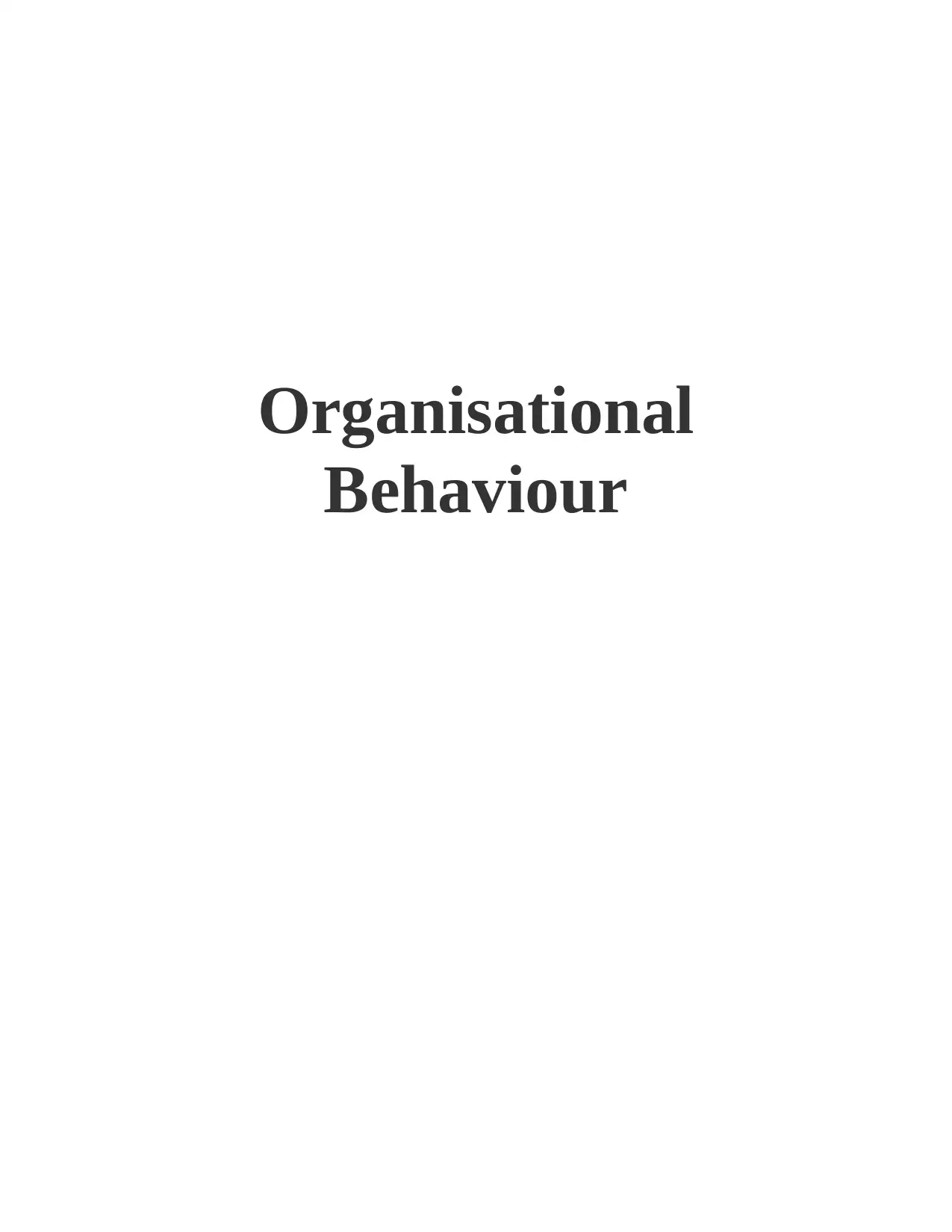
Organisational
Behaviour
Behaviour
Paraphrase This Document
Need a fresh take? Get an instant paraphrase of this document with our AI Paraphraser
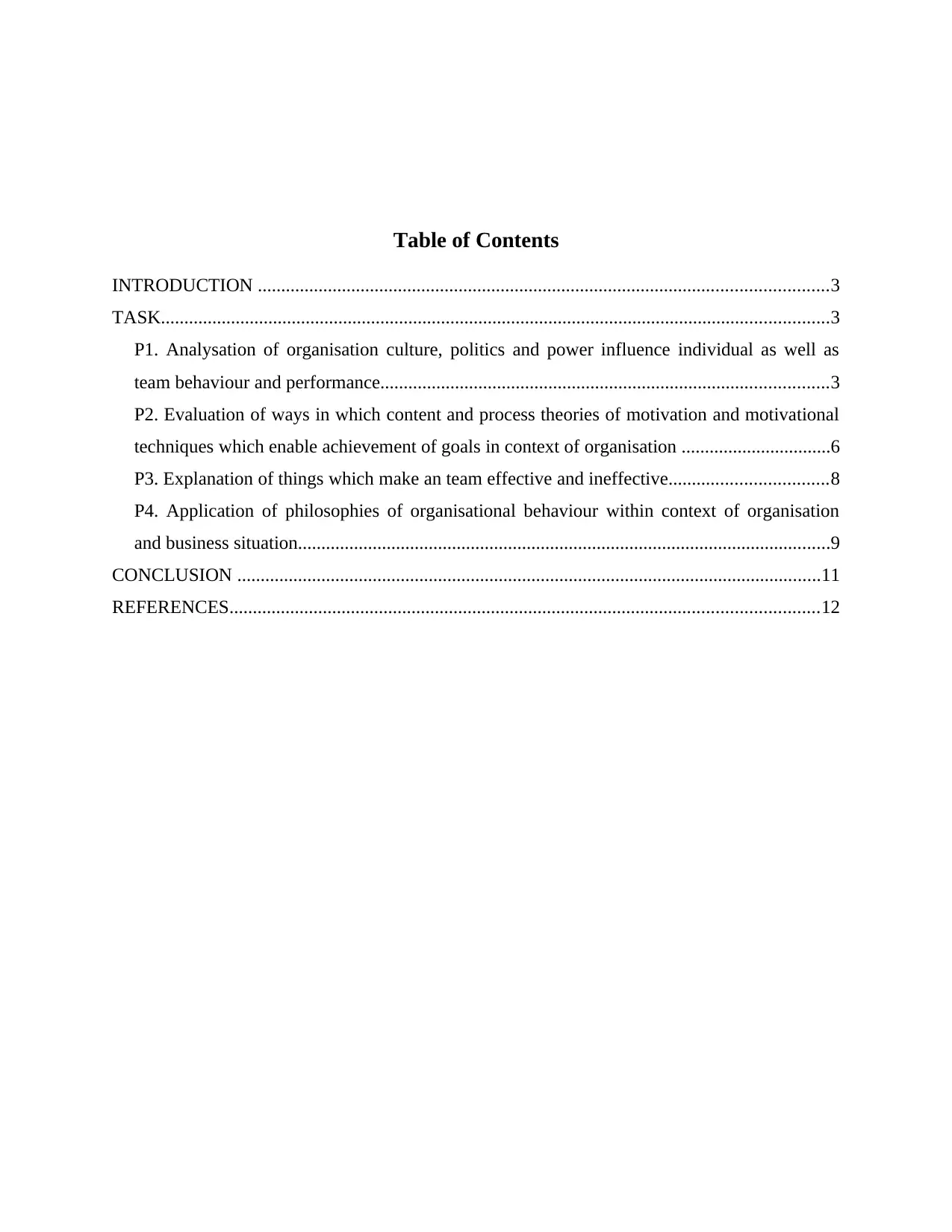
Table of Contents
INTRODUCTION ..........................................................................................................................3
TASK...............................................................................................................................................3
P1. Analysation of organisation culture, politics and power influence individual as well as
team behaviour and performance................................................................................................3
P2. Evaluation of ways in which content and process theories of motivation and motivational
techniques which enable achievement of goals in context of organisation ................................6
P3. Explanation of things which make an team effective and ineffective..................................8
P4. Application of philosophies of organisational behaviour within context of organisation
and business situation..................................................................................................................9
CONCLUSION .............................................................................................................................11
REFERENCES..............................................................................................................................12
INTRODUCTION ..........................................................................................................................3
TASK...............................................................................................................................................3
P1. Analysation of organisation culture, politics and power influence individual as well as
team behaviour and performance................................................................................................3
P2. Evaluation of ways in which content and process theories of motivation and motivational
techniques which enable achievement of goals in context of organisation ................................6
P3. Explanation of things which make an team effective and ineffective..................................8
P4. Application of philosophies of organisational behaviour within context of organisation
and business situation..................................................................................................................9
CONCLUSION .............................................................................................................................11
REFERENCES..............................................................................................................................12
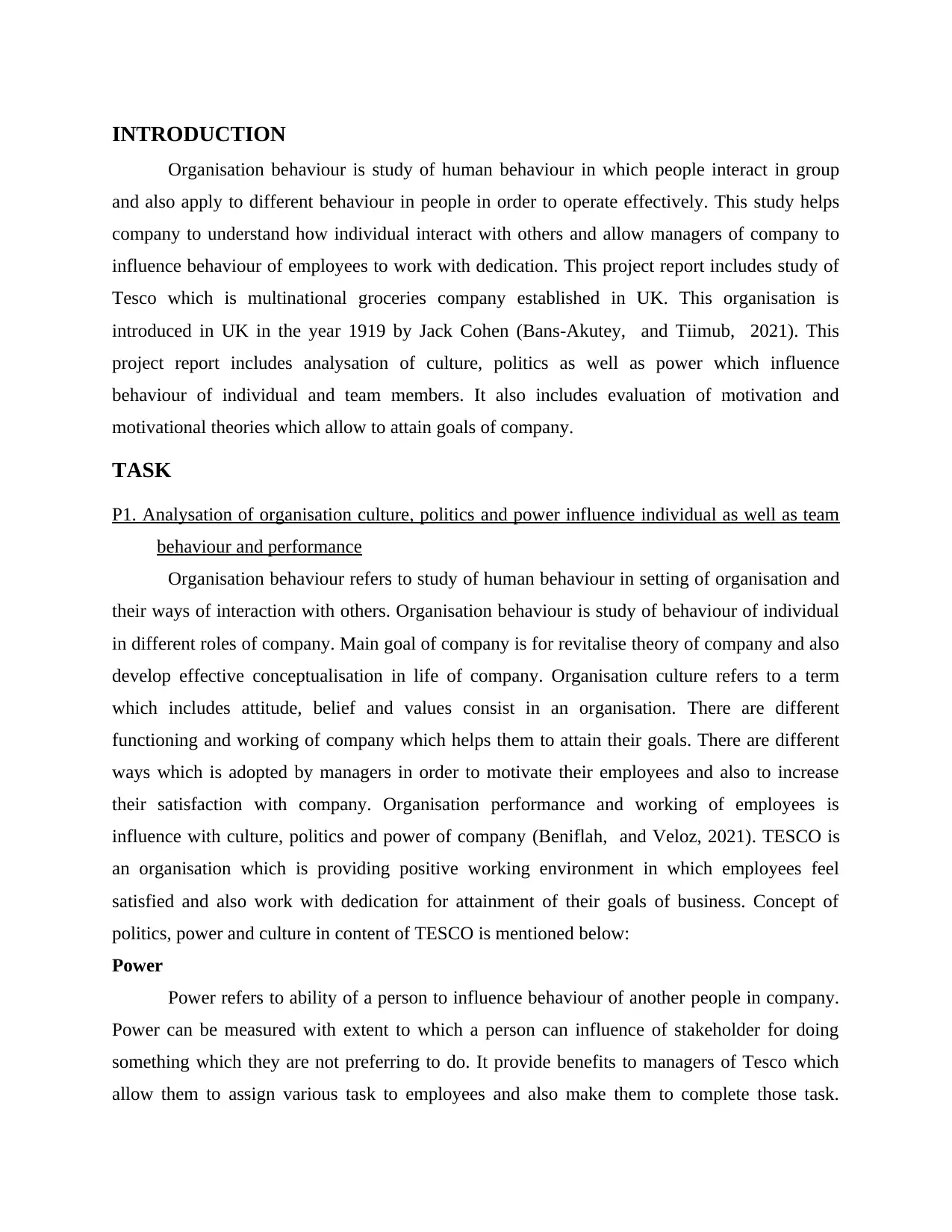
INTRODUCTION
Organisation behaviour is study of human behaviour in which people interact in group
and also apply to different behaviour in people in order to operate effectively. This study helps
company to understand how individual interact with others and allow managers of company to
influence behaviour of employees to work with dedication. This project report includes study of
Tesco which is multinational groceries company established in UK. This organisation is
introduced in UK in the year 1919 by Jack Cohen (Bans-Akutey, and Tiimub, 2021). This
project report includes analysation of culture, politics as well as power which influence
behaviour of individual and team members. It also includes evaluation of motivation and
motivational theories which allow to attain goals of company.
TASK
P1. Analysation of organisation culture, politics and power influence individual as well as team
behaviour and performance
Organisation behaviour refers to study of human behaviour in setting of organisation and
their ways of interaction with others. Organisation behaviour is study of behaviour of individual
in different roles of company. Main goal of company is for revitalise theory of company and also
develop effective conceptualisation in life of company. Organisation culture refers to a term
which includes attitude, belief and values consist in an organisation. There are different
functioning and working of company which helps them to attain their goals. There are different
ways which is adopted by managers in order to motivate their employees and also to increase
their satisfaction with company. Organisation performance and working of employees is
influence with culture, politics and power of company (Beniflah, and Veloz, 2021). TESCO is
an organisation which is providing positive working environment in which employees feel
satisfied and also work with dedication for attainment of their goals of business. Concept of
politics, power and culture in content of TESCO is mentioned below:
Power
Power refers to ability of a person to influence behaviour of another people in company.
Power can be measured with extent to which a person can influence of stakeholder for doing
something which they are not preferring to do. It provide benefits to managers of Tesco which
allow them to assign various task to employees and also make them to complete those task.
Organisation behaviour is study of human behaviour in which people interact in group
and also apply to different behaviour in people in order to operate effectively. This study helps
company to understand how individual interact with others and allow managers of company to
influence behaviour of employees to work with dedication. This project report includes study of
Tesco which is multinational groceries company established in UK. This organisation is
introduced in UK in the year 1919 by Jack Cohen (Bans-Akutey, and Tiimub, 2021). This
project report includes analysation of culture, politics as well as power which influence
behaviour of individual and team members. It also includes evaluation of motivation and
motivational theories which allow to attain goals of company.
TASK
P1. Analysation of organisation culture, politics and power influence individual as well as team
behaviour and performance
Organisation behaviour refers to study of human behaviour in setting of organisation and
their ways of interaction with others. Organisation behaviour is study of behaviour of individual
in different roles of company. Main goal of company is for revitalise theory of company and also
develop effective conceptualisation in life of company. Organisation culture refers to a term
which includes attitude, belief and values consist in an organisation. There are different
functioning and working of company which helps them to attain their goals. There are different
ways which is adopted by managers in order to motivate their employees and also to increase
their satisfaction with company. Organisation performance and working of employees is
influence with culture, politics and power of company (Beniflah, and Veloz, 2021). TESCO is
an organisation which is providing positive working environment in which employees feel
satisfied and also work with dedication for attainment of their goals of business. Concept of
politics, power and culture in content of TESCO is mentioned below:
Power
Power refers to ability of a person to influence behaviour of another people in company.
Power can be measured with extent to which a person can influence of stakeholder for doing
something which they are not preferring to do. It provide benefits to managers of Tesco which
allow them to assign various task to employees and also make them to complete those task.
⊘ This is a preview!⊘
Do you want full access?
Subscribe today to unlock all pages.

Trusted by 1+ million students worldwide
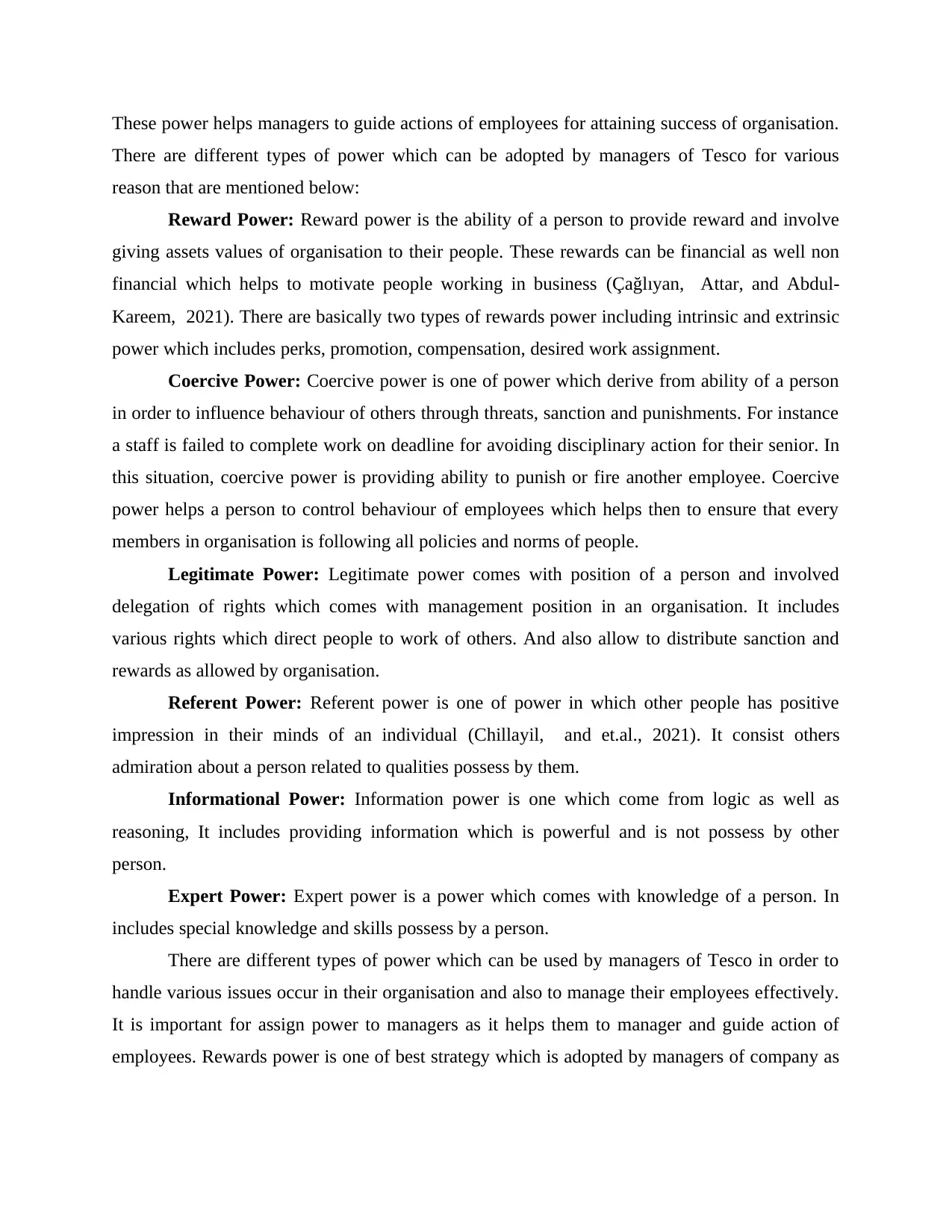
These power helps managers to guide actions of employees for attaining success of organisation.
There are different types of power which can be adopted by managers of Tesco for various
reason that are mentioned below:
Reward Power: Reward power is the ability of a person to provide reward and involve
giving assets values of organisation to their people. These rewards can be financial as well non
financial which helps to motivate people working in business (Çağlıyan, Attar, and Abdul-
Kareem, 2021). There are basically two types of rewards power including intrinsic and extrinsic
power which includes perks, promotion, compensation, desired work assignment.
Coercive Power: Coercive power is one of power which derive from ability of a person
in order to influence behaviour of others through threats, sanction and punishments. For instance
a staff is failed to complete work on deadline for avoiding disciplinary action for their senior. In
this situation, coercive power is providing ability to punish or fire another employee. Coercive
power helps a person to control behaviour of employees which helps then to ensure that every
members in organisation is following all policies and norms of people.
Legitimate Power: Legitimate power comes with position of a person and involved
delegation of rights which comes with management position in an organisation. It includes
various rights which direct people to work of others. And also allow to distribute sanction and
rewards as allowed by organisation.
Referent Power: Referent power is one of power in which other people has positive
impression in their minds of an individual (Chillayil, and et.al., 2021). It consist others
admiration about a person related to qualities possess by them.
Informational Power: Information power is one which come from logic as well as
reasoning, It includes providing information which is powerful and is not possess by other
person.
Expert Power: Expert power is a power which comes with knowledge of a person. In
includes special knowledge and skills possess by a person.
There are different types of power which can be used by managers of Tesco in order to
handle various issues occur in their organisation and also to manage their employees effectively.
It is important for assign power to managers as it helps them to manager and guide action of
employees. Rewards power is one of best strategy which is adopted by managers of company as
There are different types of power which can be adopted by managers of Tesco for various
reason that are mentioned below:
Reward Power: Reward power is the ability of a person to provide reward and involve
giving assets values of organisation to their people. These rewards can be financial as well non
financial which helps to motivate people working in business (Çağlıyan, Attar, and Abdul-
Kareem, 2021). There are basically two types of rewards power including intrinsic and extrinsic
power which includes perks, promotion, compensation, desired work assignment.
Coercive Power: Coercive power is one of power which derive from ability of a person
in order to influence behaviour of others through threats, sanction and punishments. For instance
a staff is failed to complete work on deadline for avoiding disciplinary action for their senior. In
this situation, coercive power is providing ability to punish or fire another employee. Coercive
power helps a person to control behaviour of employees which helps then to ensure that every
members in organisation is following all policies and norms of people.
Legitimate Power: Legitimate power comes with position of a person and involved
delegation of rights which comes with management position in an organisation. It includes
various rights which direct people to work of others. And also allow to distribute sanction and
rewards as allowed by organisation.
Referent Power: Referent power is one of power in which other people has positive
impression in their minds of an individual (Chillayil, and et.al., 2021). It consist others
admiration about a person related to qualities possess by them.
Informational Power: Information power is one which come from logic as well as
reasoning, It includes providing information which is powerful and is not possess by other
person.
Expert Power: Expert power is a power which comes with knowledge of a person. In
includes special knowledge and skills possess by a person.
There are different types of power which can be used by managers of Tesco in order to
handle various issues occur in their organisation and also to manage their employees effectively.
It is important for assign power to managers as it helps them to manager and guide action of
employees. Rewards power is one of best strategy which is adopted by managers of company as
Paraphrase This Document
Need a fresh take? Get an instant paraphrase of this document with our AI Paraphraser
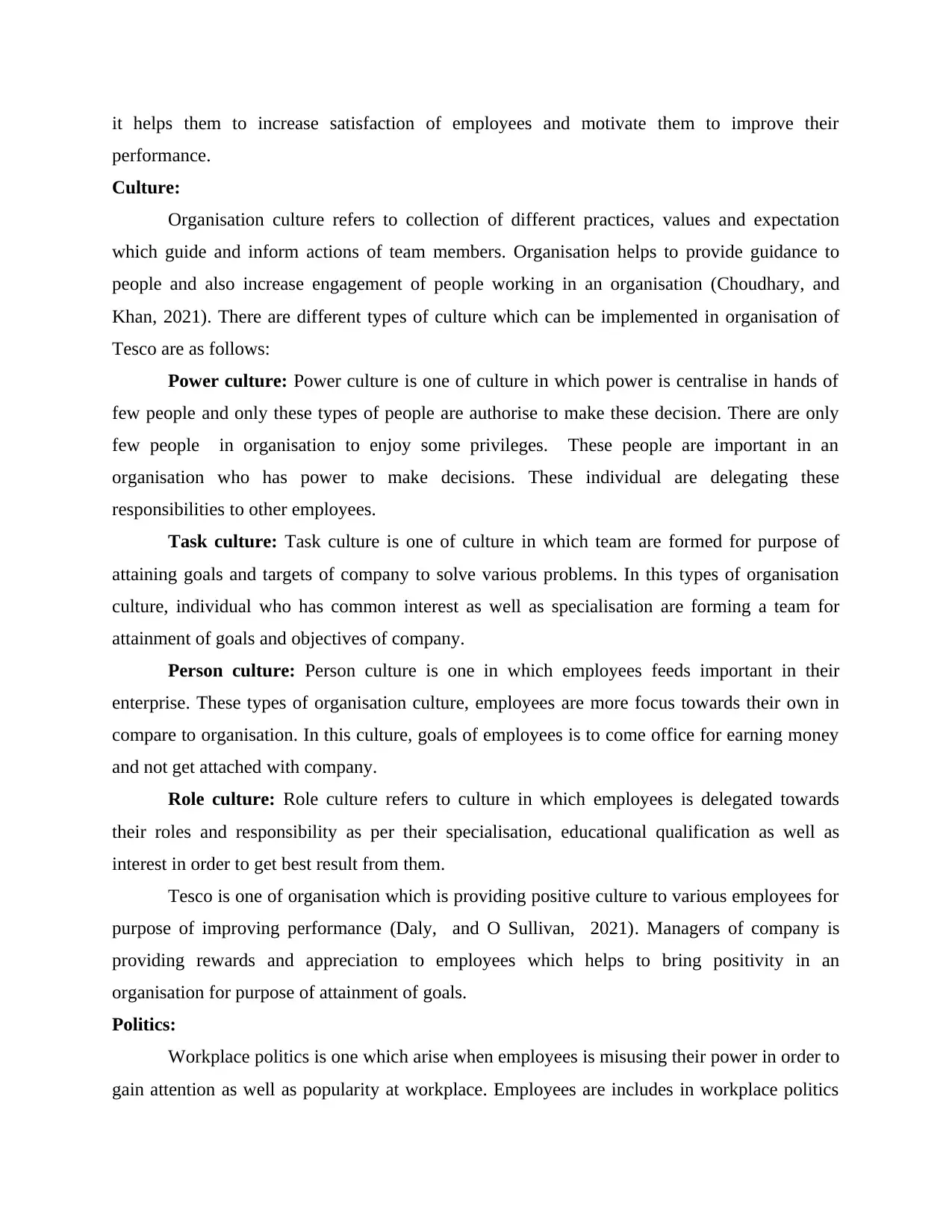
it helps them to increase satisfaction of employees and motivate them to improve their
performance.
Culture:
Organisation culture refers to collection of different practices, values and expectation
which guide and inform actions of team members. Organisation helps to provide guidance to
people and also increase engagement of people working in an organisation (Choudhary, and
Khan, 2021). There are different types of culture which can be implemented in organisation of
Tesco are as follows:
Power culture: Power culture is one of culture in which power is centralise in hands of
few people and only these types of people are authorise to make these decision. There are only
few people in organisation to enjoy some privileges. These people are important in an
organisation who has power to make decisions. These individual are delegating these
responsibilities to other employees.
Task culture: Task culture is one of culture in which team are formed for purpose of
attaining goals and targets of company to solve various problems. In this types of organisation
culture, individual who has common interest as well as specialisation are forming a team for
attainment of goals and objectives of company.
Person culture: Person culture is one in which employees feeds important in their
enterprise. These types of organisation culture, employees are more focus towards their own in
compare to organisation. In this culture, goals of employees is to come office for earning money
and not get attached with company.
Role culture: Role culture refers to culture in which employees is delegated towards
their roles and responsibility as per their specialisation, educational qualification as well as
interest in order to get best result from them.
Tesco is one of organisation which is providing positive culture to various employees for
purpose of improving performance (Daly, and O Sullivan, 2021). Managers of company is
providing rewards and appreciation to employees which helps to bring positivity in an
organisation for purpose of attainment of goals.
Politics:
Workplace politics is one which arise when employees is misusing their power in order to
gain attention as well as popularity at workplace. Employees are includes in workplace politics
performance.
Culture:
Organisation culture refers to collection of different practices, values and expectation
which guide and inform actions of team members. Organisation helps to provide guidance to
people and also increase engagement of people working in an organisation (Choudhary, and
Khan, 2021). There are different types of culture which can be implemented in organisation of
Tesco are as follows:
Power culture: Power culture is one of culture in which power is centralise in hands of
few people and only these types of people are authorise to make these decision. There are only
few people in organisation to enjoy some privileges. These people are important in an
organisation who has power to make decisions. These individual are delegating these
responsibilities to other employees.
Task culture: Task culture is one of culture in which team are formed for purpose of
attaining goals and targets of company to solve various problems. In this types of organisation
culture, individual who has common interest as well as specialisation are forming a team for
attainment of goals and objectives of company.
Person culture: Person culture is one in which employees feeds important in their
enterprise. These types of organisation culture, employees are more focus towards their own in
compare to organisation. In this culture, goals of employees is to come office for earning money
and not get attached with company.
Role culture: Role culture refers to culture in which employees is delegated towards
their roles and responsibility as per their specialisation, educational qualification as well as
interest in order to get best result from them.
Tesco is one of organisation which is providing positive culture to various employees for
purpose of improving performance (Daly, and O Sullivan, 2021). Managers of company is
providing rewards and appreciation to employees which helps to bring positivity in an
organisation for purpose of attainment of goals.
Politics:
Workplace politics is one which arise when employees is misusing their power in order to
gain attention as well as popularity at workplace. Employees are includes in workplace politics
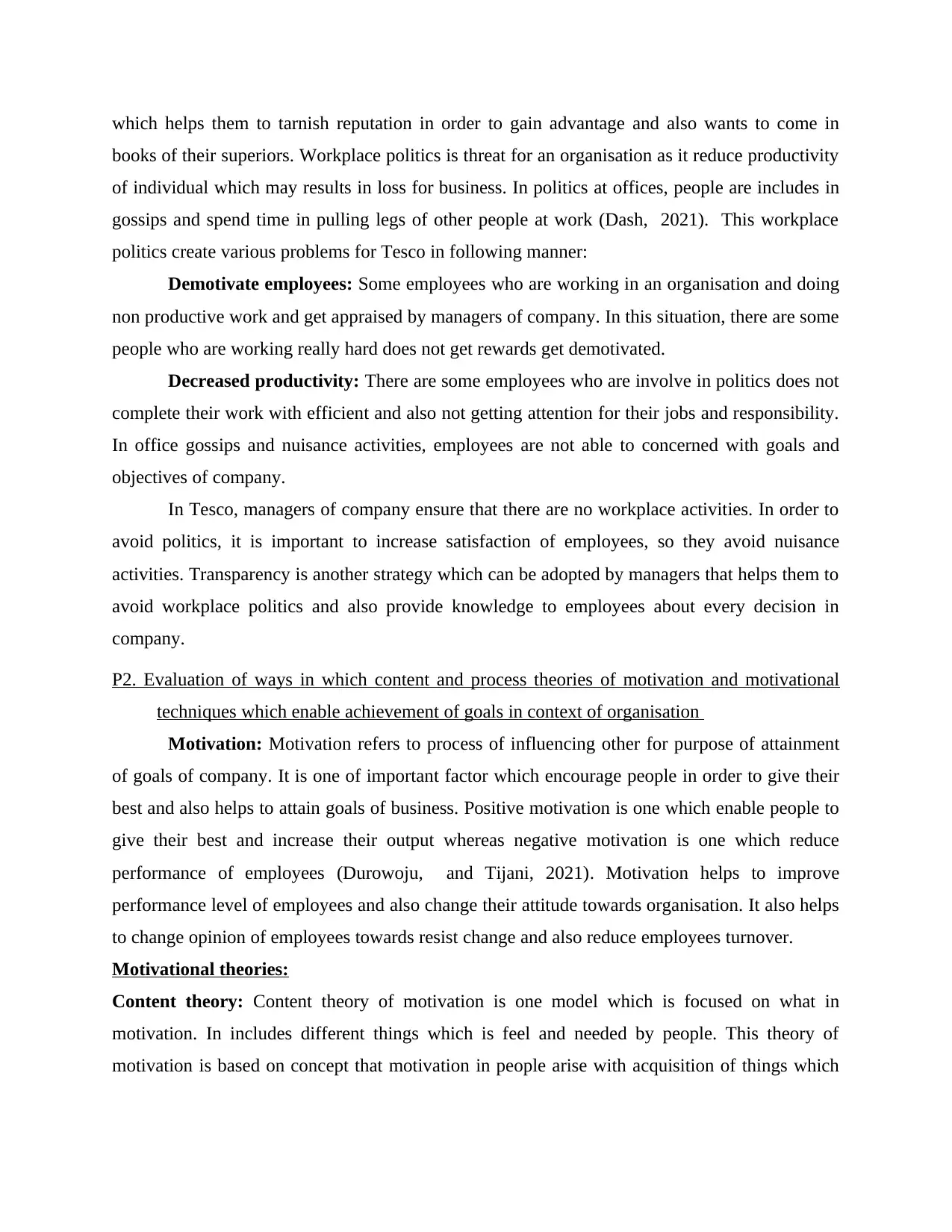
which helps them to tarnish reputation in order to gain advantage and also wants to come in
books of their superiors. Workplace politics is threat for an organisation as it reduce productivity
of individual which may results in loss for business. In politics at offices, people are includes in
gossips and spend time in pulling legs of other people at work (Dash, 2021). This workplace
politics create various problems for Tesco in following manner:
Demotivate employees: Some employees who are working in an organisation and doing
non productive work and get appraised by managers of company. In this situation, there are some
people who are working really hard does not get rewards get demotivated.
Decreased productivity: There are some employees who are involve in politics does not
complete their work with efficient and also not getting attention for their jobs and responsibility.
In office gossips and nuisance activities, employees are not able to concerned with goals and
objectives of company.
In Tesco, managers of company ensure that there are no workplace activities. In order to
avoid politics, it is important to increase satisfaction of employees, so they avoid nuisance
activities. Transparency is another strategy which can be adopted by managers that helps them to
avoid workplace politics and also provide knowledge to employees about every decision in
company.
P2. Evaluation of ways in which content and process theories of motivation and motivational
techniques which enable achievement of goals in context of organisation
Motivation: Motivation refers to process of influencing other for purpose of attainment
of goals of company. It is one of important factor which encourage people in order to give their
best and also helps to attain goals of business. Positive motivation is one which enable people to
give their best and increase their output whereas negative motivation is one which reduce
performance of employees (Durowoju, and Tijani, 2021). Motivation helps to improve
performance level of employees and also change their attitude towards organisation. It also helps
to change opinion of employees towards resist change and also reduce employees turnover.
Motivational theories:
Content theory: Content theory of motivation is one model which is focused on what in
motivation. In includes different things which is feel and needed by people. This theory of
motivation is based on concept that motivation in people arise with acquisition of things which
books of their superiors. Workplace politics is threat for an organisation as it reduce productivity
of individual which may results in loss for business. In politics at offices, people are includes in
gossips and spend time in pulling legs of other people at work (Dash, 2021). This workplace
politics create various problems for Tesco in following manner:
Demotivate employees: Some employees who are working in an organisation and doing
non productive work and get appraised by managers of company. In this situation, there are some
people who are working really hard does not get rewards get demotivated.
Decreased productivity: There are some employees who are involve in politics does not
complete their work with efficient and also not getting attention for their jobs and responsibility.
In office gossips and nuisance activities, employees are not able to concerned with goals and
objectives of company.
In Tesco, managers of company ensure that there are no workplace activities. In order to
avoid politics, it is important to increase satisfaction of employees, so they avoid nuisance
activities. Transparency is another strategy which can be adopted by managers that helps them to
avoid workplace politics and also provide knowledge to employees about every decision in
company.
P2. Evaluation of ways in which content and process theories of motivation and motivational
techniques which enable achievement of goals in context of organisation
Motivation: Motivation refers to process of influencing other for purpose of attainment
of goals of company. It is one of important factor which encourage people in order to give their
best and also helps to attain goals of business. Positive motivation is one which enable people to
give their best and increase their output whereas negative motivation is one which reduce
performance of employees (Durowoju, and Tijani, 2021). Motivation helps to improve
performance level of employees and also change their attitude towards organisation. It also helps
to change opinion of employees towards resist change and also reduce employees turnover.
Motivational theories:
Content theory: Content theory of motivation is one model which is focused on what in
motivation. In includes different things which is feel and needed by people. This theory of
motivation is based on concept that motivation in people arise with acquisition of things which
⊘ This is a preview!⊘
Do you want full access?
Subscribe today to unlock all pages.

Trusted by 1+ million students worldwide
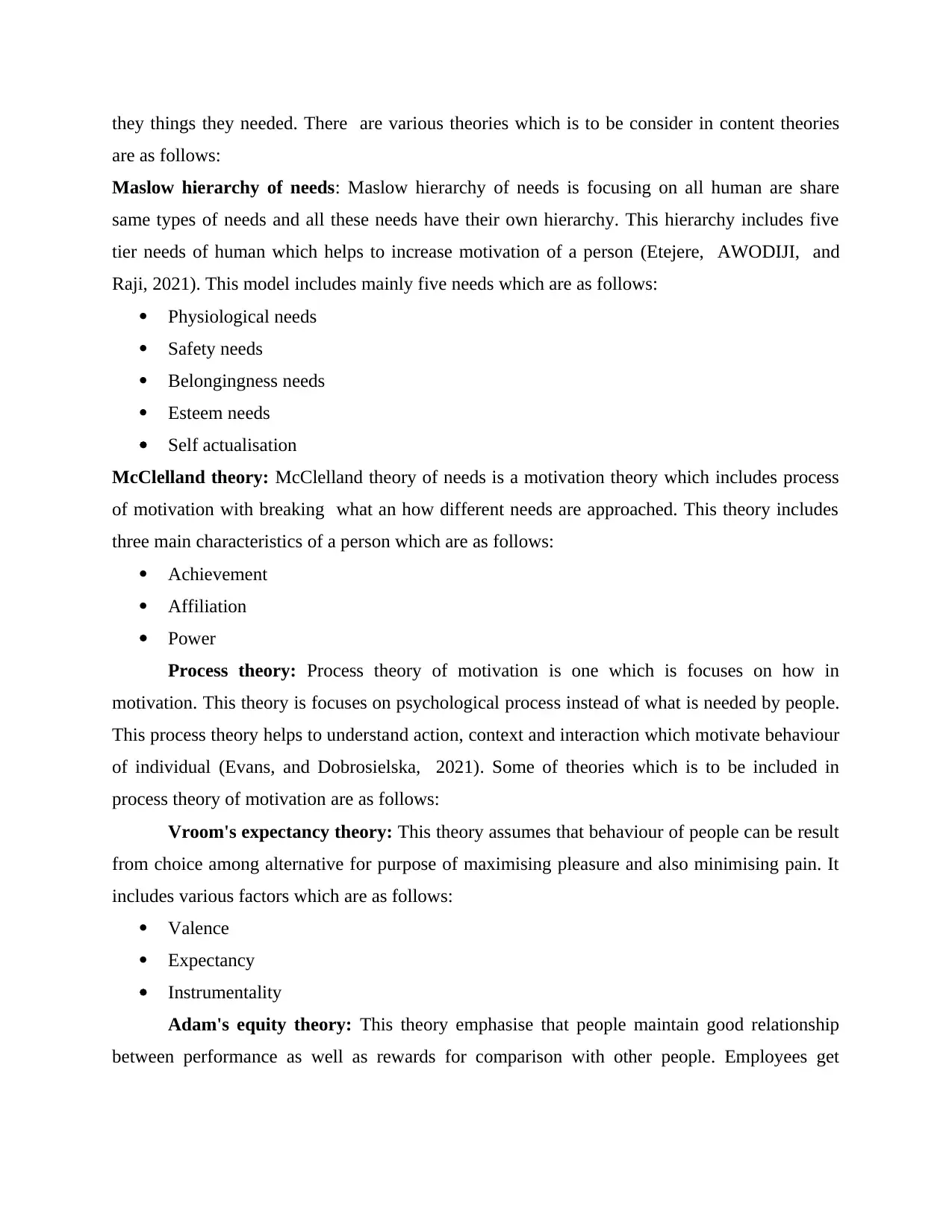
they things they needed. There are various theories which is to be consider in content theories
are as follows:
Maslow hierarchy of needs: Maslow hierarchy of needs is focusing on all human are share
same types of needs and all these needs have their own hierarchy. This hierarchy includes five
tier needs of human which helps to increase motivation of a person (Etejere, AWODIJI, and
Raji, 2021). This model includes mainly five needs which are as follows:
Physiological needs
Safety needs
Belongingness needs
Esteem needs
Self actualisation
McClelland theory: McClelland theory of needs is a motivation theory which includes process
of motivation with breaking what an how different needs are approached. This theory includes
three main characteristics of a person which are as follows:
Achievement
Affiliation
Power
Process theory: Process theory of motivation is one which is focuses on how in
motivation. This theory is focuses on psychological process instead of what is needed by people.
This process theory helps to understand action, context and interaction which motivate behaviour
of individual (Evans, and Dobrosielska, 2021). Some of theories which is to be included in
process theory of motivation are as follows:
Vroom's expectancy theory: This theory assumes that behaviour of people can be result
from choice among alternative for purpose of maximising pleasure and also minimising pain. It
includes various factors which are as follows:
Valence
Expectancy
Instrumentality
Adam's equity theory: This theory emphasise that people maintain good relationship
between performance as well as rewards for comparison with other people. Employees get
are as follows:
Maslow hierarchy of needs: Maslow hierarchy of needs is focusing on all human are share
same types of needs and all these needs have their own hierarchy. This hierarchy includes five
tier needs of human which helps to increase motivation of a person (Etejere, AWODIJI, and
Raji, 2021). This model includes mainly five needs which are as follows:
Physiological needs
Safety needs
Belongingness needs
Esteem needs
Self actualisation
McClelland theory: McClelland theory of needs is a motivation theory which includes process
of motivation with breaking what an how different needs are approached. This theory includes
three main characteristics of a person which are as follows:
Achievement
Affiliation
Power
Process theory: Process theory of motivation is one which is focuses on how in
motivation. This theory is focuses on psychological process instead of what is needed by people.
This process theory helps to understand action, context and interaction which motivate behaviour
of individual (Evans, and Dobrosielska, 2021). Some of theories which is to be included in
process theory of motivation are as follows:
Vroom's expectancy theory: This theory assumes that behaviour of people can be result
from choice among alternative for purpose of maximising pleasure and also minimising pain. It
includes various factors which are as follows:
Valence
Expectancy
Instrumentality
Adam's equity theory: This theory emphasise that people maintain good relationship
between performance as well as rewards for comparison with other people. Employees get
Paraphrase This Document
Need a fresh take? Get an instant paraphrase of this document with our AI Paraphraser
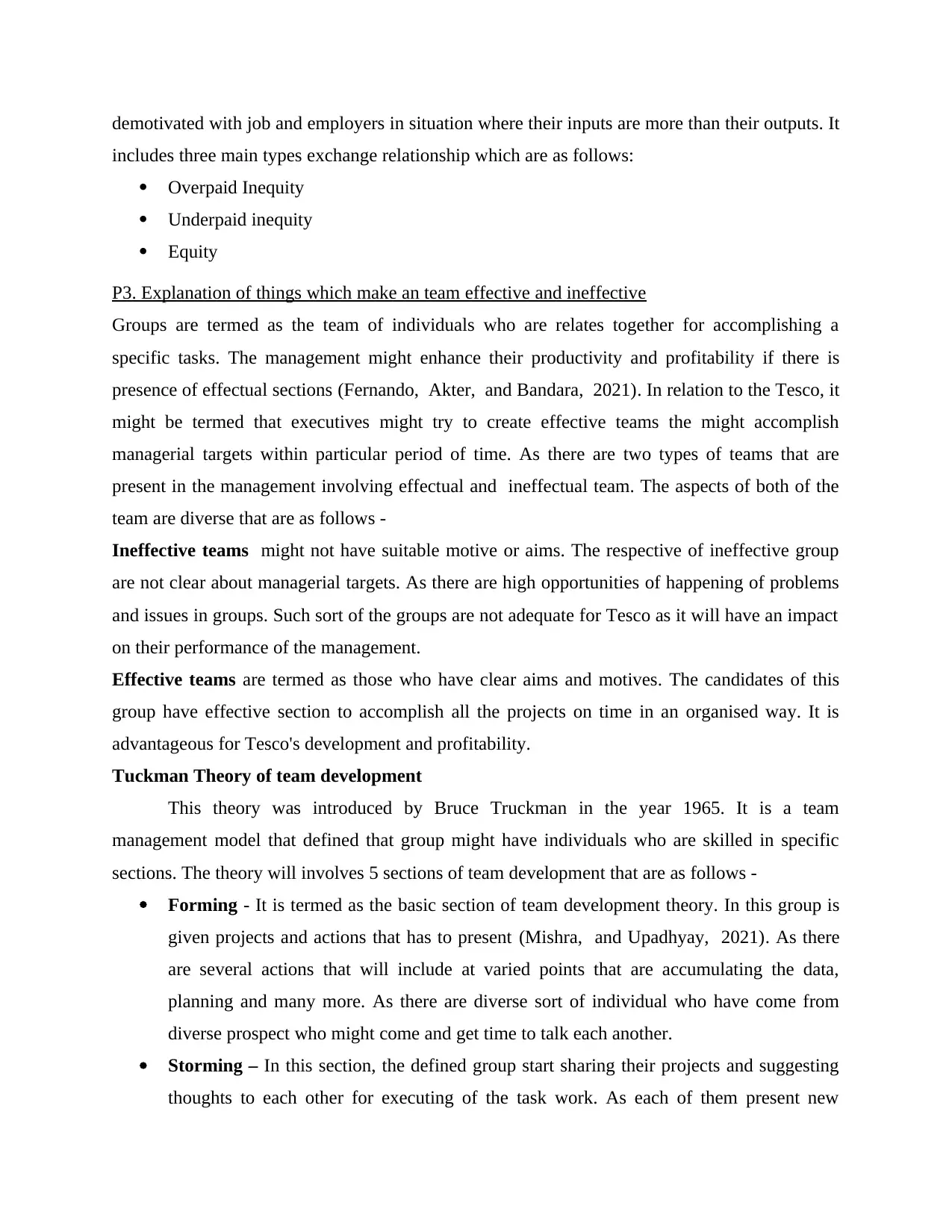
demotivated with job and employers in situation where their inputs are more than their outputs. It
includes three main types exchange relationship which are as follows:
Overpaid Inequity
Underpaid inequity
Equity
P3. Explanation of things which make an team effective and ineffective
Groups are termed as the team of individuals who are relates together for accomplishing a
specific tasks. The management might enhance their productivity and profitability if there is
presence of effectual sections (Fernando, Akter, and Bandara, 2021). In relation to the Tesco, it
might be termed that executives might try to create effective teams the might accomplish
managerial targets within particular period of time. As there are two types of teams that are
present in the management involving effectual and ineffectual team. The aspects of both of the
team are diverse that are as follows -
Ineffective teams might not have suitable motive or aims. The respective of ineffective group
are not clear about managerial targets. As there are high opportunities of happening of problems
and issues in groups. Such sort of the groups are not adequate for Tesco as it will have an impact
on their performance of the management.
Effective teams are termed as those who have clear aims and motives. The candidates of this
group have effective section to accomplish all the projects on time in an organised way. It is
advantageous for Tesco's development and profitability.
Tuckman Theory of team development
This theory was introduced by Bruce Truckman in the year 1965. It is a team
management model that defined that group might have individuals who are skilled in specific
sections. The theory will involves 5 sections of team development that are as follows -
Forming - It is termed as the basic section of team development theory. In this group is
given projects and actions that has to present (Mishra, and Upadhyay, 2021). As there
are several actions that will include at varied points that are accumulating the data,
planning and many more. As there are diverse sort of individual who have come from
diverse prospect who might come and get time to talk each another.
Storming – In this section, the defined group start sharing their projects and suggesting
thoughts to each other for executing of the task work. As each of them present new
includes three main types exchange relationship which are as follows:
Overpaid Inequity
Underpaid inequity
Equity
P3. Explanation of things which make an team effective and ineffective
Groups are termed as the team of individuals who are relates together for accomplishing a
specific tasks. The management might enhance their productivity and profitability if there is
presence of effectual sections (Fernando, Akter, and Bandara, 2021). In relation to the Tesco, it
might be termed that executives might try to create effective teams the might accomplish
managerial targets within particular period of time. As there are two types of teams that are
present in the management involving effectual and ineffectual team. The aspects of both of the
team are diverse that are as follows -
Ineffective teams might not have suitable motive or aims. The respective of ineffective group
are not clear about managerial targets. As there are high opportunities of happening of problems
and issues in groups. Such sort of the groups are not adequate for Tesco as it will have an impact
on their performance of the management.
Effective teams are termed as those who have clear aims and motives. The candidates of this
group have effective section to accomplish all the projects on time in an organised way. It is
advantageous for Tesco's development and profitability.
Tuckman Theory of team development
This theory was introduced by Bruce Truckman in the year 1965. It is a team
management model that defined that group might have individuals who are skilled in specific
sections. The theory will involves 5 sections of team development that are as follows -
Forming - It is termed as the basic section of team development theory. In this group is
given projects and actions that has to present (Mishra, and Upadhyay, 2021). As there
are several actions that will include at varied points that are accumulating the data,
planning and many more. As there are diverse sort of individual who have come from
diverse prospect who might come and get time to talk each another.
Storming – In this section, the defined group start sharing their projects and suggesting
thoughts to each other for executing of the task work. As each of them present new
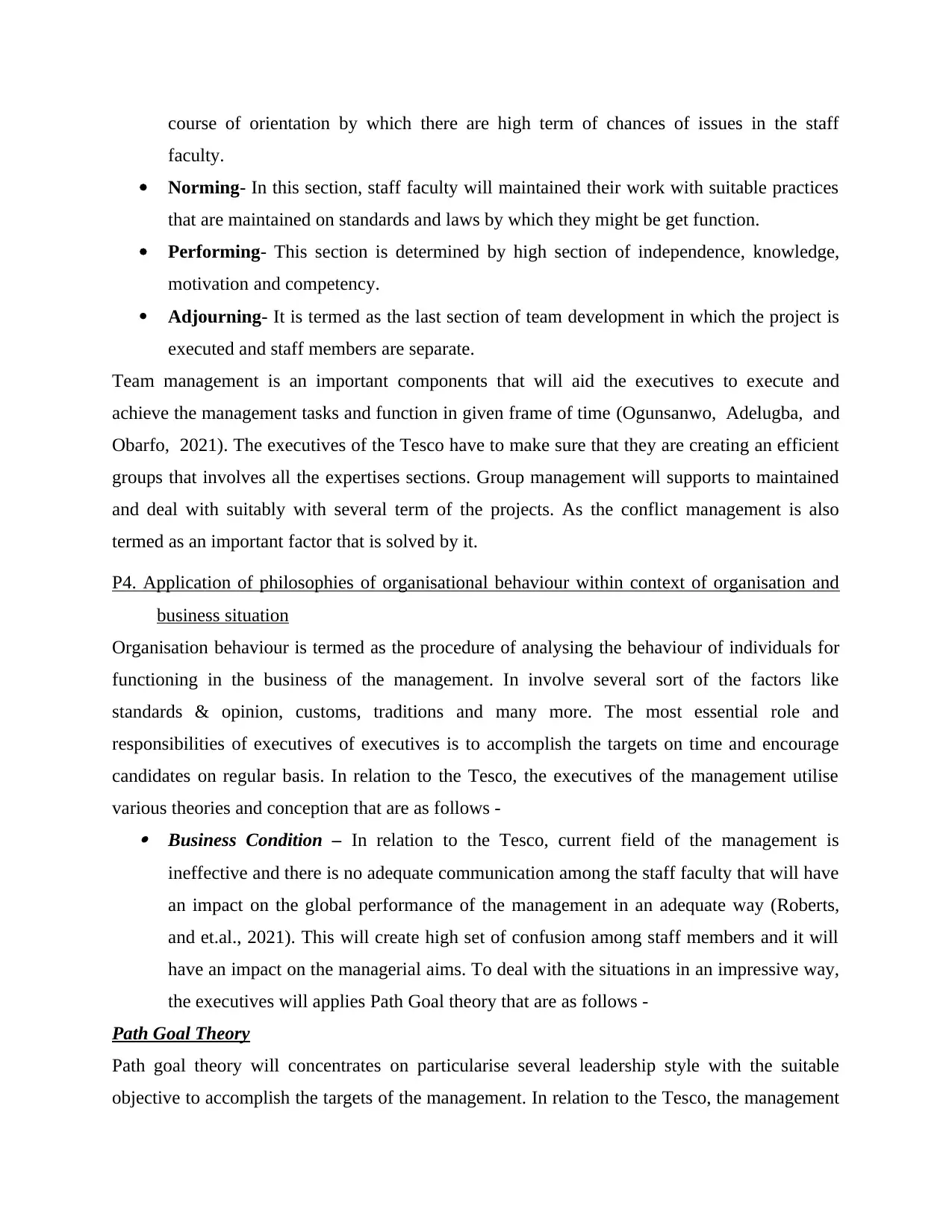
course of orientation by which there are high term of chances of issues in the staff
faculty.
Norming- In this section, staff faculty will maintained their work with suitable practices
that are maintained on standards and laws by which they might be get function.
Performing- This section is determined by high section of independence, knowledge,
motivation and competency.
Adjourning- It is termed as the last section of team development in which the project is
executed and staff members are separate.
Team management is an important components that will aid the executives to execute and
achieve the management tasks and function in given frame of time (Ogunsanwo, Adelugba, and
Obarfo, 2021). The executives of the Tesco have to make sure that they are creating an efficient
groups that involves all the expertises sections. Group management will supports to maintained
and deal with suitably with several term of the projects. As the conflict management is also
termed as an important factor that is solved by it.
P4. Application of philosophies of organisational behaviour within context of organisation and
business situation
Organisation behaviour is termed as the procedure of analysing the behaviour of individuals for
functioning in the business of the management. In involve several sort of the factors like
standards & opinion, customs, traditions and many more. The most essential role and
responsibilities of executives of executives is to accomplish the targets on time and encourage
candidates on regular basis. In relation to the Tesco, the executives of the management utilise
various theories and conception that are as follows - Business Condition – In relation to the Tesco, current field of the management is
ineffective and there is no adequate communication among the staff faculty that will have
an impact on the global performance of the management in an adequate way (Roberts,
and et.al., 2021). This will create high set of confusion among staff members and it will
have an impact on the managerial aims. To deal with the situations in an impressive way,
the executives will applies Path Goal theory that are as follows -
Path Goal Theory
Path goal theory will concentrates on particularise several leadership style with the suitable
objective to accomplish the targets of the management. In relation to the Tesco, the management
faculty.
Norming- In this section, staff faculty will maintained their work with suitable practices
that are maintained on standards and laws by which they might be get function.
Performing- This section is determined by high section of independence, knowledge,
motivation and competency.
Adjourning- It is termed as the last section of team development in which the project is
executed and staff members are separate.
Team management is an important components that will aid the executives to execute and
achieve the management tasks and function in given frame of time (Ogunsanwo, Adelugba, and
Obarfo, 2021). The executives of the Tesco have to make sure that they are creating an efficient
groups that involves all the expertises sections. Group management will supports to maintained
and deal with suitably with several term of the projects. As the conflict management is also
termed as an important factor that is solved by it.
P4. Application of philosophies of organisational behaviour within context of organisation and
business situation
Organisation behaviour is termed as the procedure of analysing the behaviour of individuals for
functioning in the business of the management. In involve several sort of the factors like
standards & opinion, customs, traditions and many more. The most essential role and
responsibilities of executives of executives is to accomplish the targets on time and encourage
candidates on regular basis. In relation to the Tesco, the executives of the management utilise
various theories and conception that are as follows - Business Condition – In relation to the Tesco, current field of the management is
ineffective and there is no adequate communication among the staff faculty that will have
an impact on the global performance of the management in an adequate way (Roberts,
and et.al., 2021). This will create high set of confusion among staff members and it will
have an impact on the managerial aims. To deal with the situations in an impressive way,
the executives will applies Path Goal theory that are as follows -
Path Goal Theory
Path goal theory will concentrates on particularise several leadership style with the suitable
objective to accomplish the targets of the management. In relation to the Tesco, the management
⊘ This is a preview!⊘
Do you want full access?
Subscribe today to unlock all pages.

Trusted by 1+ million students worldwide
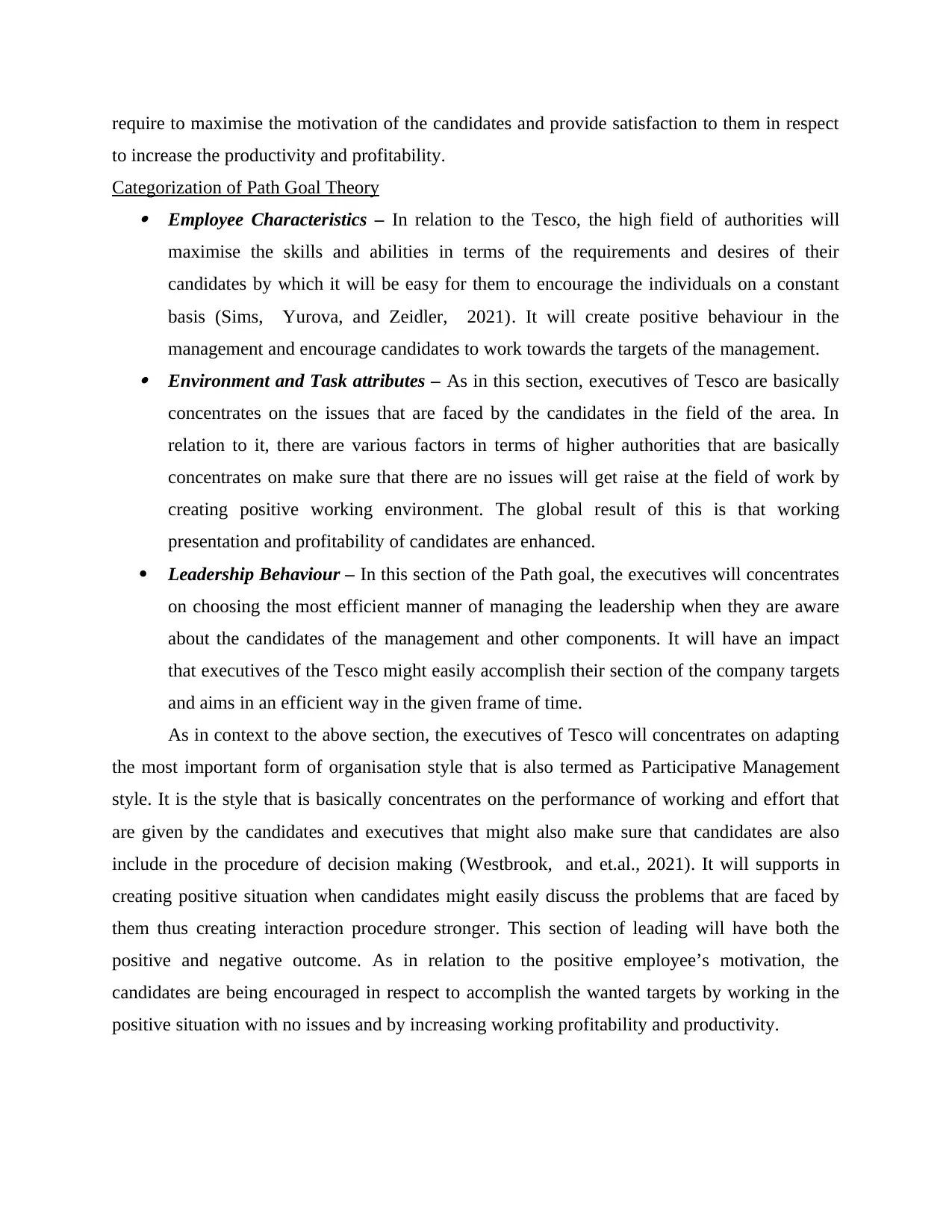
require to maximise the motivation of the candidates and provide satisfaction to them in respect
to increase the productivity and profitability.
Categorization of Path Goal Theory Employee Characteristics – In relation to the Tesco, the high field of authorities will
maximise the skills and abilities in terms of the requirements and desires of their
candidates by which it will be easy for them to encourage the individuals on a constant
basis (Sims, Yurova, and Zeidler, 2021). It will create positive behaviour in the
management and encourage candidates to work towards the targets of the management. Environment and Task attributes – As in this section, executives of Tesco are basically
concentrates on the issues that are faced by the candidates in the field of the area. In
relation to it, there are various factors in terms of higher authorities that are basically
concentrates on make sure that there are no issues will get raise at the field of work by
creating positive working environment. The global result of this is that working
presentation and profitability of candidates are enhanced.
Leadership Behaviour – In this section of the Path goal, the executives will concentrates
on choosing the most efficient manner of managing the leadership when they are aware
about the candidates of the management and other components. It will have an impact
that executives of the Tesco might easily accomplish their section of the company targets
and aims in an efficient way in the given frame of time.
As in context to the above section, the executives of Tesco will concentrates on adapting
the most important form of organisation style that is also termed as Participative Management
style. It is the style that is basically concentrates on the performance of working and effort that
are given by the candidates and executives that might also make sure that candidates are also
include in the procedure of decision making (Westbrook, and et.al., 2021). It will supports in
creating positive situation when candidates might easily discuss the problems that are faced by
them thus creating interaction procedure stronger. This section of leading will have both the
positive and negative outcome. As in relation to the positive employee’s motivation, the
candidates are being encouraged in respect to accomplish the wanted targets by working in the
positive situation with no issues and by increasing working profitability and productivity.
to increase the productivity and profitability.
Categorization of Path Goal Theory Employee Characteristics – In relation to the Tesco, the high field of authorities will
maximise the skills and abilities in terms of the requirements and desires of their
candidates by which it will be easy for them to encourage the individuals on a constant
basis (Sims, Yurova, and Zeidler, 2021). It will create positive behaviour in the
management and encourage candidates to work towards the targets of the management. Environment and Task attributes – As in this section, executives of Tesco are basically
concentrates on the issues that are faced by the candidates in the field of the area. In
relation to it, there are various factors in terms of higher authorities that are basically
concentrates on make sure that there are no issues will get raise at the field of work by
creating positive working environment. The global result of this is that working
presentation and profitability of candidates are enhanced.
Leadership Behaviour – In this section of the Path goal, the executives will concentrates
on choosing the most efficient manner of managing the leadership when they are aware
about the candidates of the management and other components. It will have an impact
that executives of the Tesco might easily accomplish their section of the company targets
and aims in an efficient way in the given frame of time.
As in context to the above section, the executives of Tesco will concentrates on adapting
the most important form of organisation style that is also termed as Participative Management
style. It is the style that is basically concentrates on the performance of working and effort that
are given by the candidates and executives that might also make sure that candidates are also
include in the procedure of decision making (Westbrook, and et.al., 2021). It will supports in
creating positive situation when candidates might easily discuss the problems that are faced by
them thus creating interaction procedure stronger. This section of leading will have both the
positive and negative outcome. As in relation to the positive employee’s motivation, the
candidates are being encouraged in respect to accomplish the wanted targets by working in the
positive situation with no issues and by increasing working profitability and productivity.
Paraphrase This Document
Need a fresh take? Get an instant paraphrase of this document with our AI Paraphraser
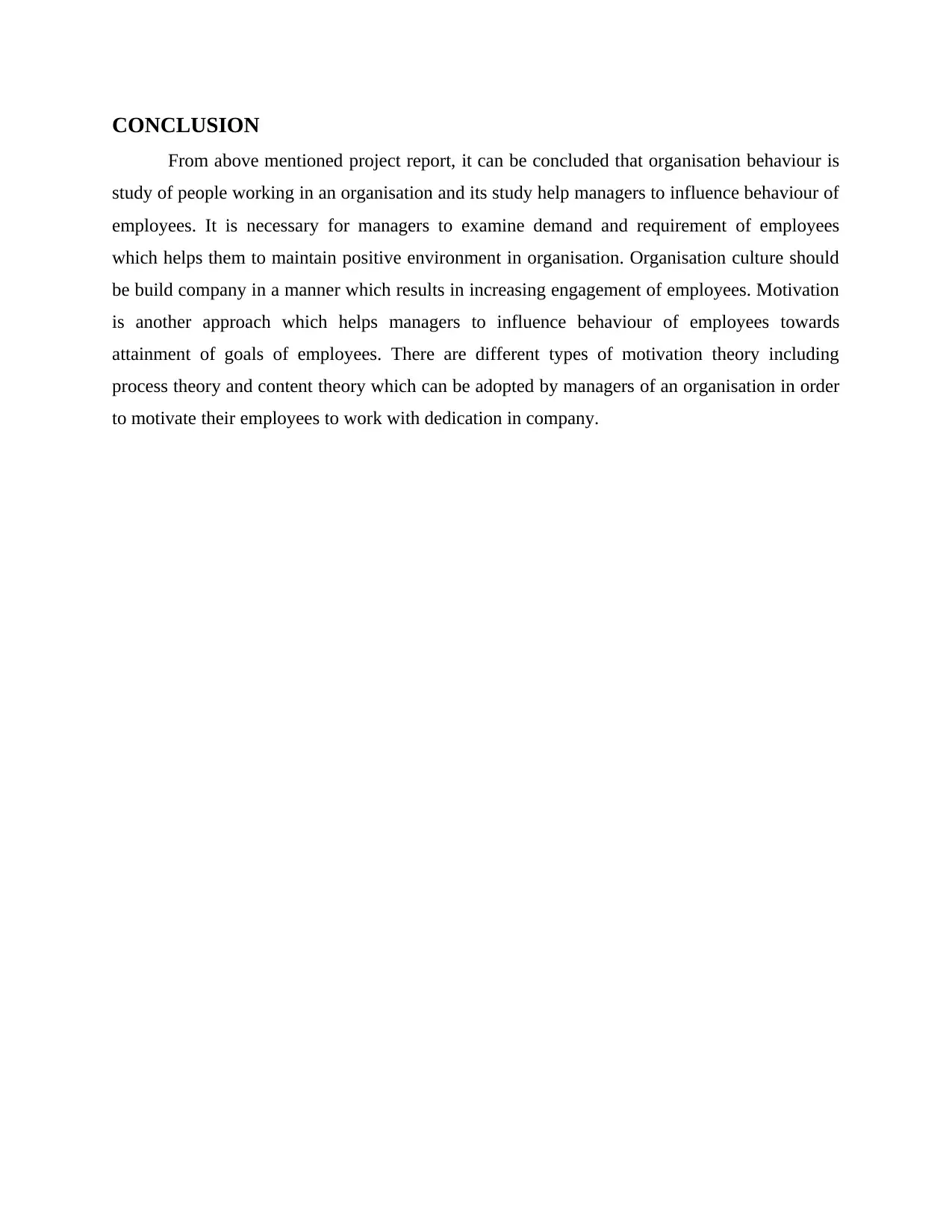
CONCLUSION
From above mentioned project report, it can be concluded that organisation behaviour is
study of people working in an organisation and its study help managers to influence behaviour of
employees. It is necessary for managers to examine demand and requirement of employees
which helps them to maintain positive environment in organisation. Organisation culture should
be build company in a manner which results in increasing engagement of employees. Motivation
is another approach which helps managers to influence behaviour of employees towards
attainment of goals of employees. There are different types of motivation theory including
process theory and content theory which can be adopted by managers of an organisation in order
to motivate their employees to work with dedication in company.
From above mentioned project report, it can be concluded that organisation behaviour is
study of people working in an organisation and its study help managers to influence behaviour of
employees. It is necessary for managers to examine demand and requirement of employees
which helps them to maintain positive environment in organisation. Organisation culture should
be build company in a manner which results in increasing engagement of employees. Motivation
is another approach which helps managers to influence behaviour of employees towards
attainment of goals of employees. There are different types of motivation theory including
process theory and content theory which can be adopted by managers of an organisation in order
to motivate their employees to work with dedication in company.
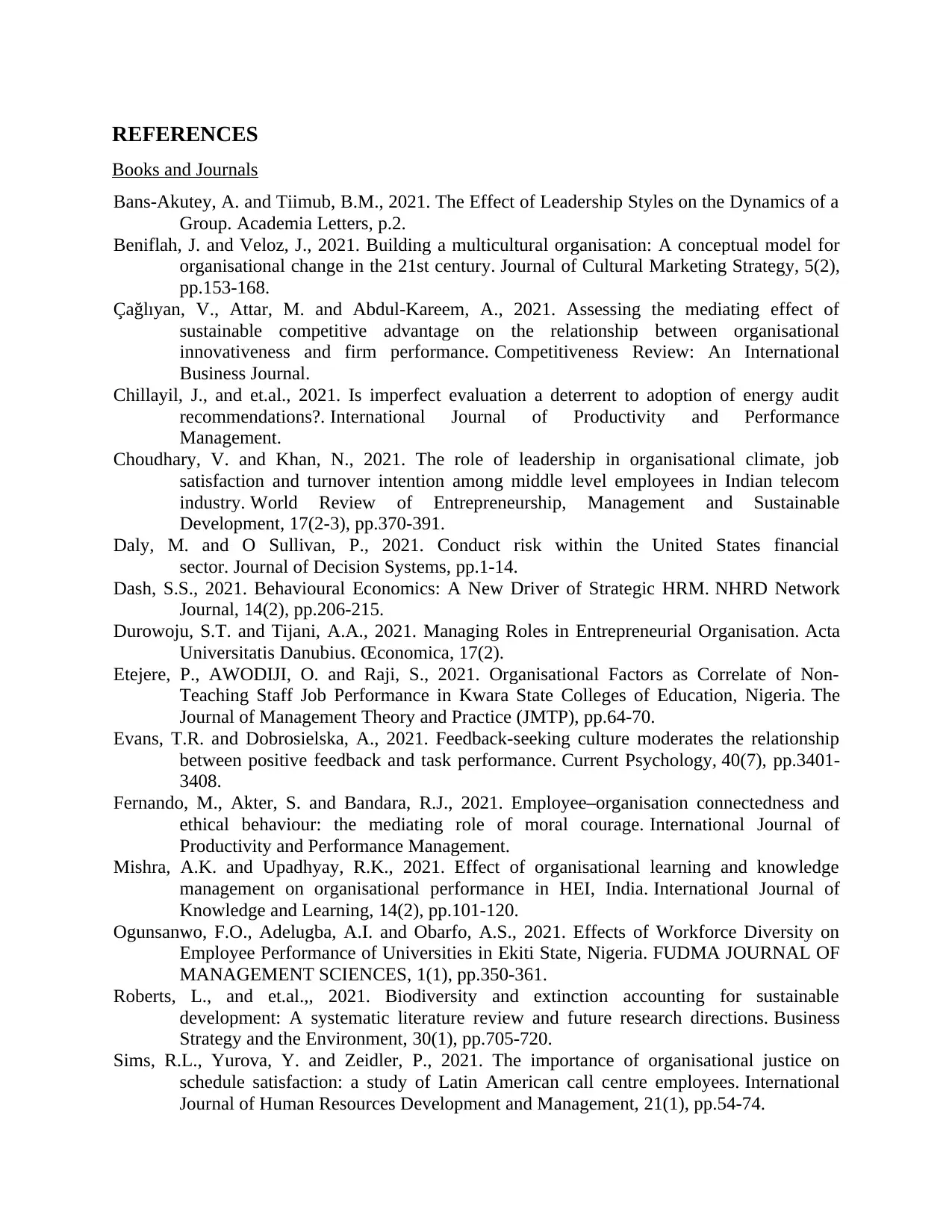
REFERENCES
Books and Journals
Bans-Akutey, A. and Tiimub, B.M., 2021. The Effect of Leadership Styles on the Dynamics of a
Group. Academia Letters, p.2.
Beniflah, J. and Veloz, J., 2021. Building a multicultural organisation: A conceptual model for
organisational change in the 21st century. Journal of Cultural Marketing Strategy, 5(2),
pp.153-168.
Çağlıyan, V., Attar, M. and Abdul-Kareem, A., 2021. Assessing the mediating effect of
sustainable competitive advantage on the relationship between organisational
innovativeness and firm performance. Competitiveness Review: An International
Business Journal.
Chillayil, J., and et.al., 2021. Is imperfect evaluation a deterrent to adoption of energy audit
recommendations?. International Journal of Productivity and Performance
Management.
Choudhary, V. and Khan, N., 2021. The role of leadership in organisational climate, job
satisfaction and turnover intention among middle level employees in Indian telecom
industry. World Review of Entrepreneurship, Management and Sustainable
Development, 17(2-3), pp.370-391.
Daly, M. and O Sullivan, P., 2021. Conduct risk within the United States financial
sector. Journal of Decision Systems, pp.1-14.
Dash, S.S., 2021. Behavioural Economics: A New Driver of Strategic HRM. NHRD Network
Journal, 14(2), pp.206-215.
Durowoju, S.T. and Tijani, A.A., 2021. Managing Roles in Entrepreneurial Organisation. Acta
Universitatis Danubius. Œconomica, 17(2).
Etejere, P., AWODIJI, O. and Raji, S., 2021. Organisational Factors as Correlate of Non-
Teaching Staff Job Performance in Kwara State Colleges of Education, Nigeria. The
Journal of Management Theory and Practice (JMTP), pp.64-70.
Evans, T.R. and Dobrosielska, A., 2021. Feedback-seeking culture moderates the relationship
between positive feedback and task performance. Current Psychology, 40(7), pp.3401-
3408.
Fernando, M., Akter, S. and Bandara, R.J., 2021. Employee–organisation connectedness and
ethical behaviour: the mediating role of moral courage. International Journal of
Productivity and Performance Management.
Mishra, A.K. and Upadhyay, R.K., 2021. Effect of organisational learning and knowledge
management on organisational performance in HEI, India. International Journal of
Knowledge and Learning, 14(2), pp.101-120.
Ogunsanwo, F.O., Adelugba, A.I. and Obarfo, A.S., 2021. Effects of Workforce Diversity on
Employee Performance of Universities in Ekiti State, Nigeria. FUDMA JOURNAL OF
MANAGEMENT SCIENCES, 1(1), pp.350-361.
Roberts, L., and et.al.,, 2021. Biodiversity and extinction accounting for sustainable
development: A systematic literature review and future research directions. Business
Strategy and the Environment, 30(1), pp.705-720.
Sims, R.L., Yurova, Y. and Zeidler, P., 2021. The importance of organisational justice on
schedule satisfaction: a study of Latin American call centre employees. International
Journal of Human Resources Development and Management, 21(1), pp.54-74.
Books and Journals
Bans-Akutey, A. and Tiimub, B.M., 2021. The Effect of Leadership Styles on the Dynamics of a
Group. Academia Letters, p.2.
Beniflah, J. and Veloz, J., 2021. Building a multicultural organisation: A conceptual model for
organisational change in the 21st century. Journal of Cultural Marketing Strategy, 5(2),
pp.153-168.
Çağlıyan, V., Attar, M. and Abdul-Kareem, A., 2021. Assessing the mediating effect of
sustainable competitive advantage on the relationship between organisational
innovativeness and firm performance. Competitiveness Review: An International
Business Journal.
Chillayil, J., and et.al., 2021. Is imperfect evaluation a deterrent to adoption of energy audit
recommendations?. International Journal of Productivity and Performance
Management.
Choudhary, V. and Khan, N., 2021. The role of leadership in organisational climate, job
satisfaction and turnover intention among middle level employees in Indian telecom
industry. World Review of Entrepreneurship, Management and Sustainable
Development, 17(2-3), pp.370-391.
Daly, M. and O Sullivan, P., 2021. Conduct risk within the United States financial
sector. Journal of Decision Systems, pp.1-14.
Dash, S.S., 2021. Behavioural Economics: A New Driver of Strategic HRM. NHRD Network
Journal, 14(2), pp.206-215.
Durowoju, S.T. and Tijani, A.A., 2021. Managing Roles in Entrepreneurial Organisation. Acta
Universitatis Danubius. Œconomica, 17(2).
Etejere, P., AWODIJI, O. and Raji, S., 2021. Organisational Factors as Correlate of Non-
Teaching Staff Job Performance in Kwara State Colleges of Education, Nigeria. The
Journal of Management Theory and Practice (JMTP), pp.64-70.
Evans, T.R. and Dobrosielska, A., 2021. Feedback-seeking culture moderates the relationship
between positive feedback and task performance. Current Psychology, 40(7), pp.3401-
3408.
Fernando, M., Akter, S. and Bandara, R.J., 2021. Employee–organisation connectedness and
ethical behaviour: the mediating role of moral courage. International Journal of
Productivity and Performance Management.
Mishra, A.K. and Upadhyay, R.K., 2021. Effect of organisational learning and knowledge
management on organisational performance in HEI, India. International Journal of
Knowledge and Learning, 14(2), pp.101-120.
Ogunsanwo, F.O., Adelugba, A.I. and Obarfo, A.S., 2021. Effects of Workforce Diversity on
Employee Performance of Universities in Ekiti State, Nigeria. FUDMA JOURNAL OF
MANAGEMENT SCIENCES, 1(1), pp.350-361.
Roberts, L., and et.al.,, 2021. Biodiversity and extinction accounting for sustainable
development: A systematic literature review and future research directions. Business
Strategy and the Environment, 30(1), pp.705-720.
Sims, R.L., Yurova, Y. and Zeidler, P., 2021. The importance of organisational justice on
schedule satisfaction: a study of Latin American call centre employees. International
Journal of Human Resources Development and Management, 21(1), pp.54-74.
⊘ This is a preview!⊘
Do you want full access?
Subscribe today to unlock all pages.

Trusted by 1+ million students worldwide
1 out of 15
Related Documents
Your All-in-One AI-Powered Toolkit for Academic Success.
+13062052269
info@desklib.com
Available 24*7 on WhatsApp / Email
![[object Object]](/_next/static/media/star-bottom.7253800d.svg)
Unlock your academic potential
Copyright © 2020–2025 A2Z Services. All Rights Reserved. Developed and managed by ZUCOL.



